|
|
|
Sort Order |
|
|
|
Items / Page
|
|
|
|
|
|
|
| Srl | Item |
| 1 |
ID:
151929
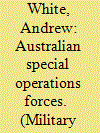

|
|
|
| 2 |
ID:
065917
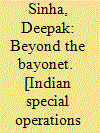

|
|
|
|
|
| Publication |
New Delhi, Gyan Publishing House, 2006.
|
| Description |
304p.
|
| Standard Number |
8121208610
|
|
|
|
|
|
|
|
|
|
|
|
Copies: C:1/I:0,R:0,Q:0
Circulation
| Accession# | Call# | Current Location | Status | Policy | Location |
| 050161 | 356.160905/SIN 050161 | Main | On Shelf | General | |
|
|
|
|
| 3 |
ID:
191054
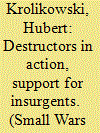

|
|
|
|
|
| Summary/Abstract |
After regaining independence in 1918, Poland faced many fundamental and strategic challenges. One of them was the issue of border crossings on the German-Polish border in Silesia. It was a region dominated by modern heavy industry, to which both the modern states laid claim. The course of the border was to be decided by a plebiscite, but the parties to the conflict resorted to violence and military means. In a complicated international situation and without the possibility of open military intervention, Poland effectively used the strategic tool of special operations – known more widely today as unconventional warfare. Thanks to their skillful application, the German military advantage was effectively eliminated and strategic goals were achieved. Poles effectively cut lines of communication, making it impossible to support pro-German organizations in Silesia, and successfully organized insurgent forces that achieved the goals important for Poland’s development policy. This paper tells the story of a special mission unit called the Destruction Group ‘Wawelberg’ and its use as a tool for implementing the state policy of unconventional warfare during the Third Silesian Uprising.
|
|
|
|
|
|
|
|
|
|
|
|
|
|
|
|
| 4 |
ID:
179963
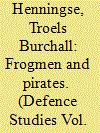

|
|
|
|
|
| Summary/Abstract |
What role can special operations forces (SOF) play against for-profit, illicit networks in operations with strict rules of engagement? How can small states utilize their SOF units to add value to a military strategy in cases where they take an active role in multinational operations? Based on in-depth interviews with members of maritime SOF units, commanding officers, and archival research, this article unearths the roles that Danish and Dutch maritime SOF units played against Somali piracy networks. Specifically, it analyses how SOF units were able to evolve their tactics, which allowed the international naval task forces to target the piracy networks’ increasingly sophisticated operations. Moreover, the article discusses other potential ways SOF units can influence for-profit, illicit networks. The case study sheds light on an aspect of the utility of SOF often overlooked in the literature, namely the ability to use discriminate and proportional violence in operations that straddle the categories of peace and war. This almost mundane use of SOF units is of special interest in relation to small states, who may take on leadership roles if they are willing to engage in the development of the operational concepts.
|
|
|
|
|
|
|
|
|
|
|
|
|
|
|
|
| 5 |
ID:
130211
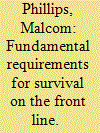

|
|
|
| 6 |
ID:
076017
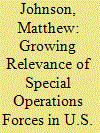

|
|
|
|
|
| Publication |
2006.
|
| Summary/Abstract |
Special Operations Forces (SOF) have transitioned from a marginalized force structure to a prominent part of U.S. military strategy. The gradual increase in status for SOF has been a long road. Historically, conventional military leaders have been skeptical of SOF and reluctant to use such forces. Political leaders, in contrast, have traditionally had an almost intuitive understanding of the capabilities and potential benefit of SOF. For the first time, military and political leaders are both convinced of the value of SOF. This shift has occurred for several factors: a dramatic change in the security environment marked by irregular threats, the declaration of the Global War on Terrorism (GWOT), and the conduct of SOF in Afghanistan and Iraq.
|
|
|
|
|
|
|
|
|
|
|
|
|
|
|
|
| 7 |
ID:
149392
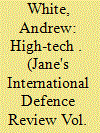

|
|
|
| 8 |
ID:
181755
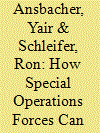

|
|
|
|
|
| Summary/Abstract |
The commission of inquiry into the events of military engagement in Lebanon in 2006 asserted that Israeli special forces were improperly deployed during the Second Lebanon War. In this article, Yair Ansbacher and Ron Schleifer explore why the Israeli special operations forces’ (SOF) contribution to campaigns have been marginal, using the 2003 US deployment of SOF in Iraq as a point of comparison. They aim to identify and define the most effective deployment modes of modern SOF in war, and explain the changes that Israeli SOF must undergo to enhance future performance.
|
|
|
|
|
|
|
|
|
|
|
|
|
|
|
|
| 9 |
ID:
144342
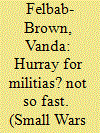

|
|
|
|
|
| Summary/Abstract |
Drawing on my fieldwork on militias in Afghanistan over the past decade, this article explores their security and political effects, with special focus on the Afghan Local Police. It analyzes changes in local security environments, effects on the Taliban insurgency and support for government, and the sustainability of and control over the militias. Key lessons include: Militias have a strong tendency to engage in abusive behavior – itself a new driver of conflict. Militias are least likely to abuse communities when they emerge spontaneously, face an abusive external force, and if major rifts and conflicts are absent from the community. Although militias might be local, their effects are not.
|
|
|
|
|
|
|
|
|
|
|
|
|
|
|
|
| 10 |
ID:
144937
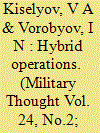

|
|
|
|
|
| Summary/Abstract |
The authors give their view of hybrid operations, a new type of warfare that is actually the annexation of a part of a target country, and take a close look at the basic components of hybrid warfare that have a decisive effect on the conduct of hybrid operations.
|
|
|
|
|
|
|
|
|
|
|
|
|
|
|
|
| 11 |
ID:
122035
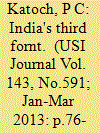

|
|
|
| 12 |
ID:
096455
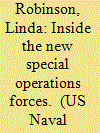

|
|
|
| 13 |
ID:
056761
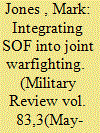

|
|
|
| 14 |
ID:
119428


|
|
|
|
|
| Publication |
2013.
|
| Summary/Abstract |
Intelligence may have a bright future. Advances in imagery and signals processing technology mean that intelligence agencies can deliver remarkably accurate and timely intelligence to civilian officials and military commanders. However much leaders gripe about intelligence, few are likely to disregard such fine-grained information about threats and opportunities, especially when national security is on the line. Others contend that intelligence is central to the kind of wars that the United States is likely to fight in the foreseeable future. Counterterrorism, for example, depends on intelligence agencies to provide detailed descriptions of terrorist organizations, warning of impending attacks, and precise targeting information for offensive actions. U.S. counterterrorism operations will persist long after the country draws down from Afghanistan, because of the geographic expansion of groups associated with al-Qaeda, and because of the growing enthusiasm for special operations forces (SOF) and unmanned aerial vehicle (UAV) strikes against them. 1 Most importantly, policymakers have invested lavishly in intelligence for over a decade. President George W. Bush called for a large increase in the intelligence personnel in the wake of the 11 September 2001 (9/11) attacks on New York City and Washington, DC. Later, Congress created the Office of the Director of National Intelligence (ODNI), adding a new layer of bureaucracy above an already sprawling constellation of agencies. And, despite a great deal of criticism, the budget for intelligence has more than doubled since 9/11 and continues to rise.
|
|
|
|
|
|
|
|
|
|
|
|
|
|
|
|
| 15 |
ID:
155380
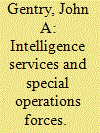

|
|
|
|
|
| Summary/Abstract |
Special operations forces (SOF) typically are small, relatively light-armed forces that rely on both their skills, and the stealth and surprise generated largely through intelligence support, to conduct strategically important missions that are often covert or clandestine. The SOF often rely heavily on national civilian as well as military intelligence agencies. Their use in sensitive operations typically requires senior-level political confidence in SOF and a domestic political climate that accepts special operations as legitimate instruments of national policy.1 Colin S. Gray, “Handfuls of Heroes on Desperate Ventures: When do Special Operations Succeed?” Parameters, Vol. 29, No. 1, Spring 1999, pp. 2–24.
[Google Scholar]
The major intelligence services also conduct “covert action” missions—plausibly deniable activities authorized by national political leaders—for strategically important reasons when other policy options are unavailable or unattractive. These activities occasionally involve the use of force by capable, specialized armed forces that are component parts of the agencies.
|
|
|
|
|
|
|
|
|
|
|
|
|
|
|
|
| 16 |
ID:
142643
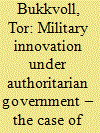

|
|
|
|
|
| Summary/Abstract |
Russian Special Forces saw significant changes to both organization and doctrine in the years after 2008. The special forces of the General Staff’s Main Intelligence Directorate were reduced in number, the organization’s institutional autonomy and rationale were changed, and an entirely new Special Operations Command was established in March 2013. This article seeks to assess the nature, scope and purpose of these changes, and to explain them by drawing on scholarship on military innovation. In particular, the article looks at military innovation in the context of a non-democratic political regime.
|
|
|
|
|
|
|
|
|
|
|
|
|
|
|
|
| 17 |
ID:
109954
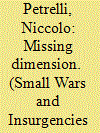

|
|
|
|
|
| Publication |
2012.
|
| Summary/Abstract |
In the course of the 2006 Lebanon War the Israel Defense Forces (IDF) employed special operations forces (SOF) for raids against Hizb'allah's command and control structure. This article argues that a faulty conceptualization of the value of special operations and misguided expectations determined by the new IDF concept of operations impacted adversely on the employment of SOF for this kind of operations. Both these elements contributed in turn to substantially degrade SOF performance in the context of the war.
|
|
|
|
|
|
|
|
|
|
|
|
|
|
|
|
| 18 |
ID:
161319
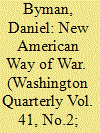

|
|
|
| 19 |
ID:
112052
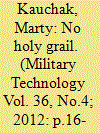

|
|
|
| 20 |
ID:
190441
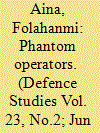

|
|
|
|
|
| Summary/Abstract |
Across the world, Special Operations Forces (SOFs) play a leading role in asymmetric warfare. The unique trainings, skills, weapons, and equipment of these elite Tier 1 operators, differentiates them from conventional forces, making them the preferred choice in complex environments. SOFs are ideally deployed for short operations, which include direct action missions, hostage rescue, hunting high-value targets (HVTs), mobility operations, intelligence operations, airborne operations, counterterrorism (CT), counterinsurgency (COIN) operations, and covert operations among others. While the literature has mostly focused on the utility of major powers’ SOFs in the Global War on Terror (GWOT), with little attention on Africa’s SOF’s, this paper examines the origins, evolution, composition, and deployments of Nigeria’s SOFs specifically in the Northeast, Northcentral, and Northwest theatres of operation, against the Boko Haram insurgency and armed banditry, respectively. Drawing on primary data from interviews with key informants and other secondary data sources, the paper interrogates the successes, challenges, and prospects of Nigeria’s SOFs. The strategic utility and overreliance on Nigeria’s SOFs by political leaders and the Military’s High Command puts a strain on their strategic value which potentially undermines their strategic efficacy as a force-multiplier in the long run, against unconventional threats.
|
|
|
|
|
|
|
|
|
|
|
|
|
|
|
|
|
|
|
|
|